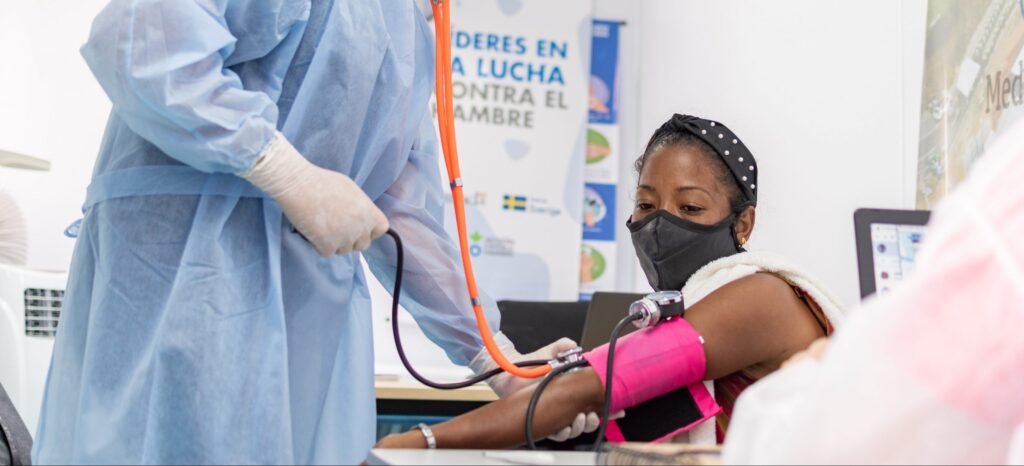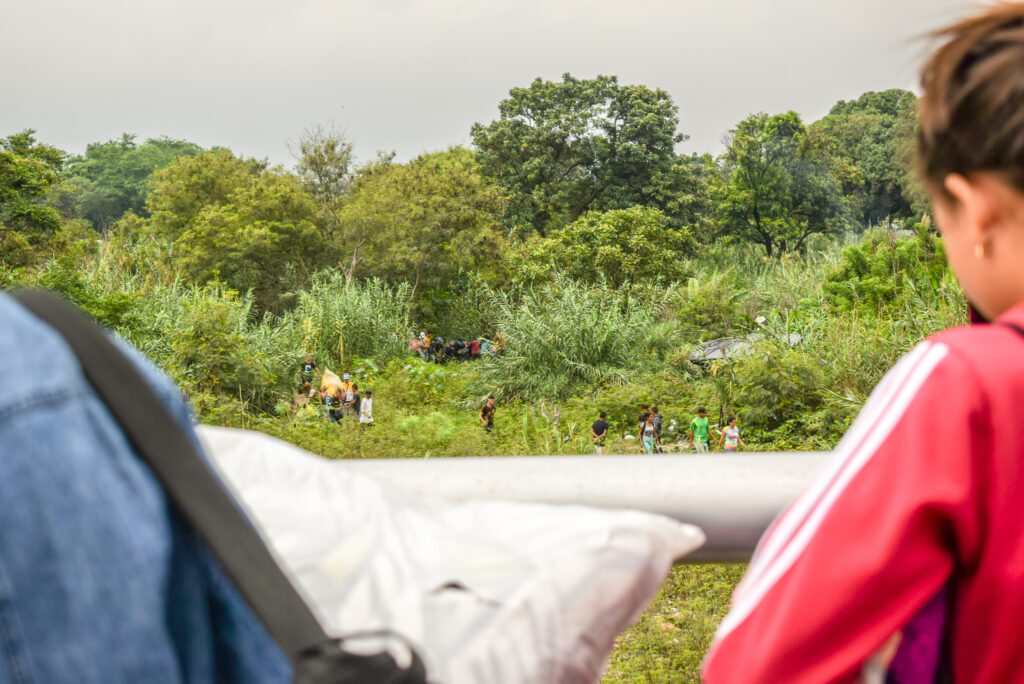Updates & Press
Blog Country Featured | August 26, 2021
Care for Los Caminantes: MedGlobal’s work at Los
Author | MedGlobalComms

By Emma Ackerman, MedGlobal Communications & Advocacy Intern
The Venezuelan migration crisis is the largest external displacement crisis in South America, and the second largest in the world. Since 2015, an estimated 5.6 million Venezuelan people, 10% of the total population, have fled the country. These Venezuelan migrants are known as “Los Caminantes”, or “the walkers,” as most travel distances of up to 3,500 km on their route to neighboring countries almost entirely on foot. According to a special representative of the UNHCR, “Never in our history in Latin America have we faced such movement of people out of a country that was one of the richest in the region and a country that is not at war.”
Venezuela currently faces a myriad of humanitarian disasters involving the joint failure of political, economic, and healthcare systems on all levels. Venezuela’s already unstable economy has been crippled by COVID-19 and has seen a 3,012% inflation increase in 2021. Purchasing power of individual households has also continued to plunge. In 2021, the monthly minimum wage in Venezuela could purchase under 1% of the basic food basket in comparison to October 2020. Intersecting crises drive migratory flows from Venezuela to surrounding Latin American countries. As of December 2020, Colombia hosts 1.8 million displaced Venezuelans, more than any other country in South America. At least 49% are women.
Alongside economic collapse, the healthcare system has taken severe blows. It is difficult to quantify the impact of the Venezuelan economic crisis on public health, since no official statistics from the Venezuelan Ministry of Health have been published since 2016. However, available data suggests that both infant and maternal mortality have increased significantly since 2016 as availability of essential medications has severely decreased. Basic services such as food supply and clean water have also collapsed, as 59% of homes in Venezuela are unable to access nutritious foods, and 86% lack reliable access to clean water. Widespread food insecurity has contributed to the prevalence of acute malnutrition, a health issue most severely impacting Venezuelan children. In a recent “Monitoring of Acute Malnutrition and Family Food Security” report, it was found that 73% of cases of malnutrition were found in children under the age of five. Malnutrition has stunted an entire generation of Venezuelan children’s growth by 8-10 cm, and will impact their future cognitive development and emotional health. Internal unrest and systematic violations of human rights have also driven migration and have harmed the health of Venezuelan people.

COVID-19 has also brought many closures of land borders and formal migration routes commonly used by los caminantes. These route closures have driven many to seek out informal, more dangerous paths to nearby countries, many of which are controlled by armed groups and human traffickers. Reports indicate that anywhere from 1,800 to 2,000 people have been leaving Venezuela daily over the last three months.
Dangerous environmental conditions and prevalence of respiratory diseases, insect borne diseases, waterborne diseases, sexually transmitted diseases, and hypothermia makes migration out of Venezuela dangerous and potentially deadly for all. Clean water, sanitation services, and hygiene products are all extremely difficult to come by. Vulnerable populations such as pregnant women and children are most likely to experience negative health outcomes and even death along these routes. Gender-based violence and grave violations against children are extremely common along informal migration routes. According to an International Crisis Group report from December, murder, forced sex work & sex trafficking, child sexual assualt, armed robbery, and child recruitment into armed groups have been well documented along the Venezuela-Colombia border. Robbery and transportation scams are also quite common, and families often lose their entire life savings after being robbed and left to walk or beg for rides along the migration route. Why do so many take the risk when the dangers are known? According to Francisco Rivas, it is because:
“Hunger is stronger than border policy. It’s stronger than fear of COVID, too. These people have no choice, and neither do I. If I don’t cross, my family doesn’t eat.”

In response to the many needs of los caminantes on routes from Venezuela to Colombia, the Colombian government has established way stations and health centers along the north-south route most commonly taken by los caminantes. MedGlobal was asked by the Colombian government to run the medical clinic supporting the Los Patios Migration Station (CASLP) in Los Patios, Norte de Santander, alongside a partner NGO. The medical clinic at Los Patios opened on April 15, 2021, and is the first health center on the los caminantes route passing through eastern Colombia to Bogota. Los Patios is the official “center of sanitary and transitory support to the migrants,” and offers a myriad of medical and health services coordinated by MedGlobal. These services include:
- Medical evaluation and care
- Dispensation of basic medication
- Referral to hospital if needed
- Evaluation and staging of pregnancy for pregnant women in the camp/ obstetrical services
- Mental health screenings
- Food and kitchen access
- Wifi access
- Hygiene kits and WASH facilities
- Legal and social services
- Rapid COVID-19 testing
- COVID-19 contact tracing services
Los Patios receives mainly women and children, especially children travelling alone. MedGlobal Colombia staff members and medical volunteers provide continuous care for all in need and fill many existing gaps in health care services. According to Colombia Program Manager Angela Restrepo:
“Since April, we have become vital for health operations at camp. We are the only ones who are providing consultations from Monday to Friday and two Saturdays per month. We also have a record of almost 400 medical consultations, 400 prescriptions dispensed, and about 1,000 COVID-1919 test services provided to the population entering into the camp.”
In February 2021, the Colombian government granted temporary protective status (TPS) to 1.7 million Venezuelans living in Colombia, making great strides toward ensuring protection and access to health care for this displaced population. This is especially critical, as los caminantes have often been without access to much-needed health care even upon reaching Colombia. Approximately 50% of patient consultations and medical services available to los caminantes are offered by NGOs such as MedGlobal. It is critical to continue supporting los caminantes – through the promotion of their rights, through global support for this protracted humanitarian emergency, and through access to comprehensive health care.


